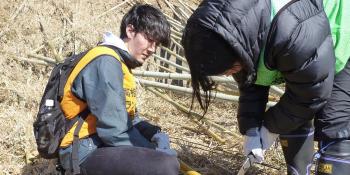
Agents of change
MANILA (March 19, 2018) – Giving voice to those in need of adequate housing is a common thread that runs across the first proposals that have been awarded the 2018 Habitat Young Leaders Build advocacy grants. As part of the Asia-Pacific region’s largest youth-driven campaign, the advocacy grants program recognize creativity, innovation and inclusiveness to effect change.
A total of 36 submissions from seven Asia-Pacific countries were received. The following stood out:
- “Youth Beyond Four Walls” is a project developed by a Fijian organization to spur young people to advocate for Fijians’ right to adequate housing. CEASEY, or Creating Environment, Advocacy and Social Empowerment for Youth, will interview informal settlers for a better understanding of their shelter needs. The group will create a social media campaign to share its findings and raise awareness by placing articles in local media and in discussions with the relevant government ministries and departments. The group aims to generate more public discussions and debates on the right to adequate housing, and to encourage youth involvement in volunteer and community advocacy work.
- In Hong Kong, storytelling is the preferred mode of engagement for Sit Ka Kin who studies at the Chinese University of Hong Kong. It is estimated that more than 200,000 people, of whom 20 percent are children, live in subdivided apartments. Together with other youths, Ka Kin will interview the children and their families who live in these cramped quarters as well as social workers. With the material gathered, they plan to hold a photo exhibition to raise awareness of the families’ plight. The group will also examine research on Hong Kong’s current housing policies and comment on policy inadequacies through the use of the photographs.
- Meanwhile, Japanese undergraduate Hiroyoshi Kusaba aims to show how sound disaster resilience policies can help to achieve the Sustainable Development Goals. Together with his school mates from Meijigakuin University’s Campus Chapter, he will visit areas that were affected by the Fukushima nuclear disaster following the 2011 earthquake and tsunami in northern Japan. They will interview evacuee families who chose to return to the affected community after the government’s lifting of the evacuation order in 2017. The students will also mobilize youth volunteers to help the affected communities to prepare the land for farming. In addition, the students will organize a workshop to discuss how the SDGs can be used to pass on the key lessons from the Fukushima accident to future generations.
Join the Habitat Young Leaders Build community on Facebook bit.ly/HabitatYLB. Post on social media with the hashtag #HabitatYLB. Follow on Instagram @HabitatYLB.